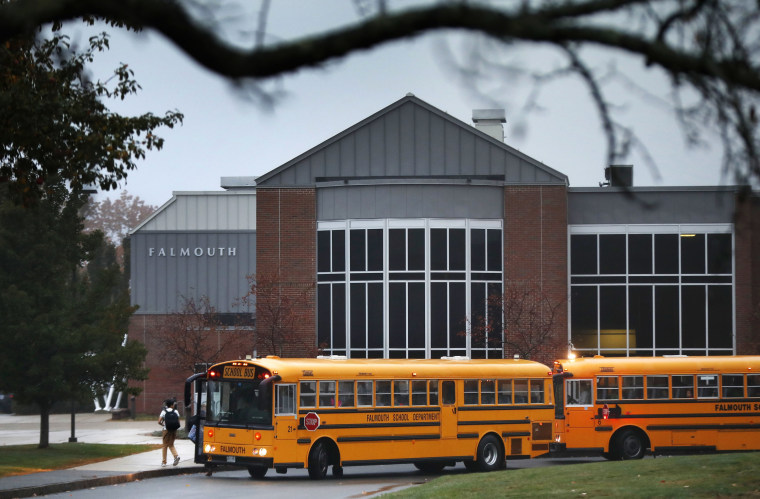This Election Day, at a number of voting locations across America, polls will be open — but the schools that house them will not.
Public schools, with their ample parking, handicapped-accessible spaces, and capacity to hold large crowds, have always made for popular polling places.
And while numerous states or cities have always closed schools on Election Day in past years, the particularly contentious nature of this presidential campaign has brought up more concerns than usual.
"Elections are always going to raise a little bit of tension between people, but with the candidates this year, it's obviously a little more heated," said Sara Andriotis, a mother of two who lives in the battleground state of Pennsylvania.
"They're expecting more than we've ever had ... Just to err on the side of caution, we decided to close those schools."
Her school district in Easton, Pa., decided to cancel classes on Election Day after Andriotis and other parents brought up fears that violence could break out at the schools' polling places.
Related: Feds Concerned About Risk of Violence as Election Day Nears
There's no official tally of how many schools will be closed nationwide on Nov. 8, according to the National School Boards Association. But in various districts from New Jersey to Nebraska, officials have canceled classes, or moved polling out of schools to other buildings this year.
In North Carolina, another battleground state, the Johnson County school board opted to close schools after local election officials warned that turnout would be higher than ever.
"They're expecting more than we've ever had," Nathanael Shelton, director of communications for Johnson County schools, told NBC News. "Just to err on the side of caution, we decided to close those schools."
The fears stem from a tense election season in which a Hillsborough, North Carolina, GOP campaign office was firebombed and voters have made a habit of holding up posters threatening violence against the candidates. A USATODAY/Suffolk University poll released Wednesday found that 51 percent of likely voters are concerned about the possibility of Election Day violence.
Even federal officials have expressed apprehension as Election Day approaches, with one telling NBC News that authorities were particularly worried about the "I'm a patriot and if it comes to it, I'll grab my weapons and defend my flag" Trump supporters.
Related: Trump Supporter Brings Clinton Effigy, Noose to Rally
But the idea of Election Day school closures isn't new or unique to this election. In New York state, many districts have been closed for years, including those in New York City, the largest school district in the United States with 1.1 million students.
Supporters point to student safety as the number one reason for closing schools, citing the high number of outsiders flowing in and out of buildings. Many also believe closing schools helps voter turnout and emphasizes the importance of civic duty to students.
"It's important that they have adequate provisions in place to address the issue of increased activity around the school."
But detractors believe it unnecessarily forces students to miss out on class time and forces an academic makeup day, and say instead of staying home, students could go about their normal day and simply skip gym or not go in the auditorium if polling were taking place in those parts of their schools.
Thomas Hylton, a member of the Pottstown school board, about 35 miles outside of Philadelphia — where schools will be open on Election Day — dismisses any safety concerns.
"The risk is so slight as to not even be a concern. People tend to be concerned about things that are very unlikely to happen," Hylton told NBC News. As for whether this election carries a higher risk of violence than past years, Hylton said, "I don't see any difference."
Regardless, schools need to adequately prepare for an influx of visitors if they serve as polling places, said Ronald Stephens, the executive director of the National School Safety Center.
"The question for schools would be whether their polling place that they use for elections does provide a degree of adequate separation or security so that school can continue to go on safely without disrupting the educational process," Stephens told NBC News.
Schools should also expect a high amount of vehicular traffic and be sure pedestrians are safe, he added.
"It's important that they have adequate provisions in place to address the issue of increased activity around the school," he said. "It would be important to have additional formal supervision around the school, whether that's campus supervisors or if they have a school resource officer on campus, just monitoring what's there."

